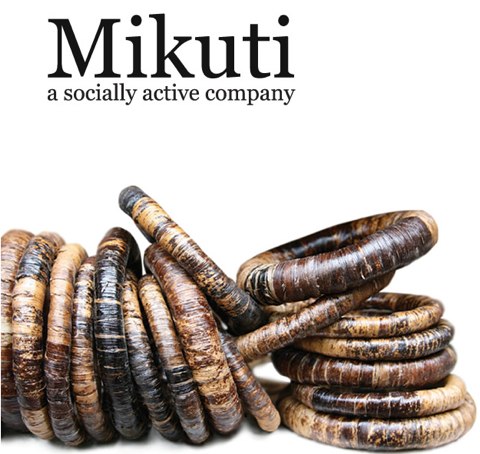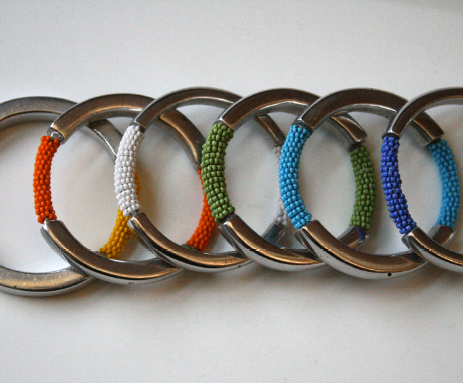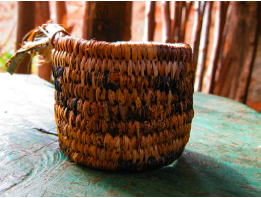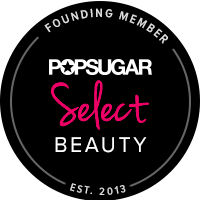Defined as ‘dried leaf’ in Kiswahili, the jewelry brand Mikuti specializes in partnering and collaborating with individuals, workshops, and artists within Tanzania to help foster a sustainable economy in which workers receive fair wages for their handcrafted goods. The Mikuti story started in 2009, while founder Erika Freund was volunteering with a NGO (Non-Governmental Organization) in the Meru District of Tanzania, and came to the realization that the banana tree could yield some artisan crafted, beautiful baubles.
Fast forward to 2011: Freund offers an array of beautiful, handmade bracelets and necklaces, ranging in price from $27-$95 made of banana tree bark, local textiles, and recycled aluminum — beautiful to look at, wonderful to think about, and perfect to give as a gift this holiday season! We also got to interview Ms. Freund about her journey and her vision for the future of the brand; read below:
FPD: Tell us a bit about your background prior to founding Mikuti?
EF: I grew up in New Jersey, but throughout my 20’s I moved around a bit; Boston, Sydney Australia, Washington DC, and Brooklyn, NY. I studied English during my undergrad, and I have a Masters of Social Work from New York University. My professional experience has a bit of variety to it; I advised international students for many years, working with hundreds of people who spoke English as a second language. I’ve also done a lot of program development for the social service sector, primarily always working with women and at risks female youth. I think one of my biggest strengths is being able to communicate in many environments and get really creative, which helps because my Swahili is far from proficient.
FPD: What are your long-term goals for the brand, lets say for five years from now what do you hope to have accomplished?
EF: My most important long-term goal of the brand is for the pieces to be recognized. I want people to know that a bracelet is a Mikuti bracelet when they look at it. I want Mikuti to be a known brand that people love and look forward to seeing the new collections. I’m also very focused on connecting with designers in Tanzania and Kenya in hopes of collaborating with them. This is something that’s really important to me. I feel as though there has been so much buzz about “ethical fashion” and “trade not aide” and the truth is, there are some amazing designers in East Africa creating hot, ready to wear styles that people in the west don’t know about. We see a lot of designers collaborating with local NGO’s (Non-Governmental Organization), which is fantastic. But no one is seeing that there is an abundance of very talented young designers in this region who would be so much fun to collaborate with.
FPD: How difficult (or easy) was it to set up the different groups and individuals that you work with, i.e. Edu-Care and Shanga?
EF: Working with people, anywhere in the world requires cultivating a relationship with them. I have a genuine interest in others and I enjoy the process of getting to know someone. This has been a huge part of why working with Edu-Care and Shanga has worked so well. Because before I started actually working with them, I spent time with them. I had a lot to learn about how the workshop worked and functioned and I had to learn about the other individuals’ and their lives, schedules, and other responsibilities before I was able to ask them to work with me. I also think that we’ve worked through some tough patches together, in terms of production and design. That’s how strong partnerships are created.
FPD: Why jewelry, and are there plans to expand into other categories?
EF: It started with a bracelet, just one basic banana bark bracelet. I’m really enjoying the process of designing jewelry right now. I’ve been working on some great necklaces for the spring/summer 2012 and I’m really excited to see the pieces through the creative process. I would love to do a line of handbags because personally they are a favorite of mine. I am a confessed handbag junkie. But I’m not there yet, hopefully one day.
FPD: Which style is your favorite?
EF: I love every piece, but the original bangles will always have my heart.
Where is Mikuti available for purchase?
EF: Online at www.mikuti.com and Calalilai stores in New York City (Brooklyn, Union Square, and Soho).
FPD: What is the number one most important message that people should receive about Mikuti?
EF: I have to give you two – first and the most important that we try to be extremely cognizant of the way our work and decisions impact the individuals we work with. Secondly, that we have so much fun in Tanzania with the people we work with, we laugh a lot or they laugh a lot, at me.
-Julia DiNardo












